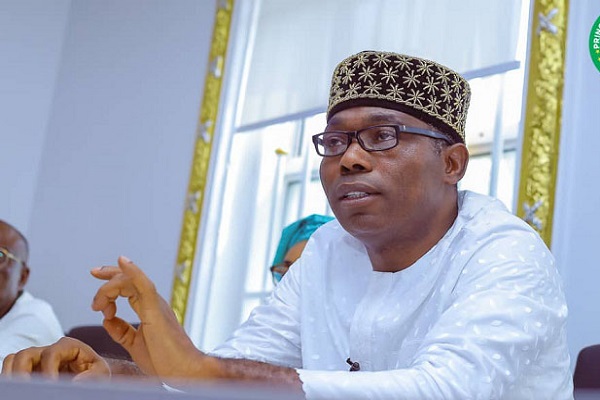With issues around subsidy removal and economy still dominating public discourse, Prince Adewole Adebayo, presidential flag-bearer of the Social Democratic Party (SDP) in the February 2023 general elections, offers insights into what the government should do to minimize the negative impacts of increases in fuel price, a development being controlled mainly by market forces. In this interview with some journalists, he spoke on many other issues bordering on the economy and welfare of the people.
Subsidy removal, palliatives and other issues
There are two types of people who criticise the subsidy removal. Some of them are hypocrites and some are consistent. Those who criticised subsidy removal like me and other people, they have grounds to criticise the programme. But those who supported anyone, any platform that said they would remove subsidy from day one are hypocritical. Once you agreed to throw a five year old child from 10 floor of a building, you cannot say I am surprised the child broke the limbs. There is no way you will implement the policy they are implementing now that you are not going to have the same consequences. Economics does not admit of cheating. You can cheat in politics, you can inflate your numbers in politics, but when it comes to economics, you can’t. You have to take the right policies. If you don’t take the right policies, the consequences of wrong policies will follow.
When we are talking about hypocrisy, the hypocrisy didn’t start with the labour unions, hypocrisy started with people who opposed former President Goodluck Jonathan when he had smaller amount of subsidy adjustment and all of them went on the streets against it. And when they came to power, they went in the opposite direction finished everything once and for all. It is not a political statement when you say people are hypocritical. We predicted all this. We were discussing it then. Nobody can pretend that they are not aware that it will affect factor cost. If it affects factor cost, it will affect cost of living. If it affects cost of living, more people will go into poverty. Just look at the position they took before and look at the position they are taking now. There is nothing new in what has happened; it is just the natural consequence of the action. And that was why during the presidential debate, we were pushing for alternative view that they should not do it, but they have done it now, nothing has surprised me at all.
First, we should stop misusing the word palliative. With N8,000, this is carried over from the existing 2023 budget. The carryover is the by-product of the plan the Buhari administration left behind as to how they would manage the subsidy removal. Even this £800m from the World Bank was negotiated by the past government. Policy watchers shouldn’t behave as if they didn’t know that it was in the offing. It appears the government is not aware of what we called monetary neutrality. When you have no food, you have no means of transportation, and when you have no Medicare, throwing money at you is not going to increase the number of service providers; it is not going to increase the value of real goods in the market. What it is going to do is that there would be waste, and the money will not be well used. When the money gets to the end user, it is useless to them in real terms because it does not have goods to chase with the money. In the end, it may cause a little bit of inflation. The way to go about it now is that the consensus as it appears that the Nigerian elite is behaving as if there is no alternative to subsidy removal. The subsidy has gone. I don’t agree with it though, but it is a policy of the government and it appears every mainstream political party and analyst agreed with that policy.
And if you want to continue along that line, what you do is to delink the people from the value chain of petrol. And the way to do that is, for example, from the transportation and logistics point of view, you make sure that price of petrol does not impact on the ability of people to commute. That is why you see many cities, whether it is Singapore or London, what you see is that the common people don’t see the effects when the price of petroleum goes up or down because the government has provided public transportation that has been delinked from that. The common people are the easiest to take off that line.
There are three factors affecting it (prices of goods) and none of them is accidental. It is the byproduct of our politics. We are either importing as we are importing now, or we are preparing the market in continuation of importation, meaning even if you are producing petroleum in Lagos, or Port-Harcourt or Akwa Ibom or Kaduna, the intention of the policymakers is that just as we don’t regulate the price of telephone, shoes or clothing or anything you buy in the market, you just follow what goes on in the international market. That is the policy position taken by APC, PDP and Labour, that is the mainstream right-wing parties in Nigeria.
They are leaving the naira to what they call market forces and the market is regulated by foreign currency. So, even the Nigerian government has lost control over its own currency and has no control over how the petrol is traded. The inputs you use for petrol, whether it is the crude oil or refinery engineering cost, administration or manpower, they are all regulated by the US dollars. Unfortunately, most of the things people need in their lives are controlled by government policy but politics controls who goes into government. So, if you don’t identify your interest very well and articulate them and decide which of your life’s activities is going to be dependent on government decisions. Those who are dependent on government decisions should be involved in your politics
If your well-being, sustainability, cost of living, employment, purchasing power, and ability to preserve the fruit of your labour to live in peace, all are implicated by government decisions. Therefore, they should be the ones to dictate your politics. These are the things you should consider when you are in politics. In economics, everything is about choice. There are many alternative routes to development. Nigeria is a resource-rich country. I am not saying that because of the number. I am saying it because of the quality of the people we have. Nigeria is rich in manpower. I think it is not too late for the government, starting with President Tinubu and co, to rethink and have a backup plan because I have a feeling, and I am saying it with every sense of responsibility, that if they go the way they are going, they will fail woefully. Not because they hate the people, but because they are adopting models that never worked. It will surprise everyone, including President Tinubu that, in the past two months, more people have entered into poverty and they are yet to succeed in lifting five people out of poverty. The measures they are taking now will not help the economy.
Subsidy is one out of about 2, 000 government programmes that require spending government money. I studied them when I was running for President as I was looking for ways to cut cost. If you are looking at the top 100 money wasters, subsidy for petrol is not one of them. One of them is establishment costs – running the National Assembly and Presidency. Another is military spending. These are major wasters of government money. We need the military but not the waste that is there. The third is the management and funding of the JV (Joint Venture) and production-sharing contract. The fourth is fiscal management of taxation, the waivers they give which is a government programme where, apart from giving waivers, they tell business people to pay a little tax. The fifth is the way we subsidise foreign exchange. There are more than these I have stated though.
We have a duty to refine locally because it is an industrial policy decision, except when the production is toxic and problematic. It is always better to produce locally. However, it doesn’t automatically guarantee lower prices. Of course, it guarantees employment, and reliability in case of distortion in the market and you have a marginal decrease in cost. Look at other things being produced in Nigeria. Their prices are not down. Most of the cassava we consume comes from Nigeria. Why is the price of cassava not falling? We have been producing cement in Nigeria for one decade after former President Olusegun Obasanjo was everywhere supporting few people who wanted to create a monopoly market or geo-monopoly market in cement. He said once we start producing it, everybody would have cement cheaply. Cement has never been cheaper. Rather, it is even worse than before. When the government wants to commit your resources to their favourites, they will tell you “let us put our money in the hands of rich private people and you will get good prices along the way.”
You will see that Nigerian banks don’t charge you more than the foreign banks even though the banks are in Nigeria. The law of economics doesn’t have a brother or sister. Once the person is in the capitalist world and he is trying to maximise his profit, he will sell anything to his own mother at any price. So, price mechanism is just a small part of developmental economics.
Possible effects of 40% electricity tariff hike as demanded by DISCOs
It is like government driving a trailer load of cement on top of somebody’s leg and you are saying you want to reduce the pain, yet you refuse to move away from his leg and yet you don’ t want the person to cry. This cannot work. How can we pretend that we don’t know that everybody in that value chain would continue to adjust his price to cope with it? You throw dirt upstream; everybody in the downstream waterway will have to deal with the debris. The product you are fighting over is in itself dependent upon on other factor cost. If you went down to adjust the factor cost, they will raise theirs too. Those are micro-economic decisions for individual firms to make because a government that cannot guarantee the price of petrol and take a policy decision and say “it is not my responsibility to guarantee petroleum prices,” such government cannot guarantee CNG or LNG. I think what government needs to do is to foster energy production by lowering cost for everybody including finance cost, infrastructure cost, freight cost and regulatory cost.

